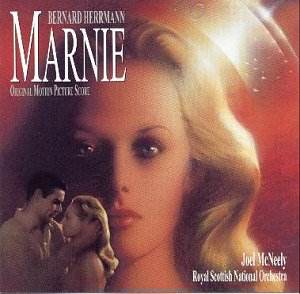| **************************************************************
EDITOR’s RECOMMENDATION November
2000
************************************************************** |
Bernard
HERRMAN
Marnie
 Original motion picture
score played by the Royal Scottish National Orchestra conducted by Joel
McNeely
Original motion picture
score played by the Royal Scottish National Orchestra conducted by Joel
McNeely
 VARÈSE SARABANDE
VSD-6094
[50:55]
VARÈSE SARABANDE
VSD-6094
[50:55]
Crotchet
Amazon
UK
Amazon
USA

Varèse Sarabande's distinguished 'Herrmann for Hitchcock' series continues
with this album that one must consider as the definitive and 'complete(?)'
recording of Marnie. As before, Joel McNeely leads the Royal Scottish
National Orchestra in a blistering, intense reading of this troubled music
that continues in the tradition of Herrmann's scores for Vertigo
and Psycho. In the entire production, I can only fault Christopher
Husted's notes. Husted, admirably and informatively, discusses the final
stages of the relationship between the composer and Hitchcock; and Herrmann's
decline around this period, provoked in no small measure by the death of
his mentor at 20th Century Fox, Alfred Newman, and the accession of his
anti-Herrmann brother, Lionel Newman. But this material, together with details
of Herrmann's career post-Marnie, occupy too much of the more meagre
8 page booklet leaving too little space for a satisfactory analysis and
discussion of the cues. (Or perhaps he had written more and it was edited
out to comply with the limited space?) Now, I appreciate that this score
has been broken down, on this disc, into 41 separate cues and Husted, quite
rightly, has chosen to concentrate on the more important but there are
significant sequences that he should have covered. These include 'Red Flowers'
where we are first aware of that very distinctive twisted low woodwind figure
that is so full of malignancy and menace; it's as exceptional as those stabbing
violin chords that shriek at you in Psycho's shower scene. And it
makes its disturbing presence at other key points in the drama. I would like
to have known what instrument Herrmann chose to use - was it an oboe in low
register, was it one of the bassoon family and was a mute used to achieve
that gripping, throaty sound? Husted gives us too little detail about the
orchestra used save mentioning that it is a smaller ensemble than that used
for Vertigo, and that it is mainly string based with harp and four
horns and winds in twos (what winds?). Analysis of the music for vital sequences
like the first robbery and the final dénouement when we learn the
reason for Marnie's psychosis are also omitted.
Husted refutes the theory that the Marnie score has much in common
with Vertigo saying that the orchestration as detailed in the last
paragraph makes the two scores very different. I cannot agree, they have
much in common. I have already mentioned the distinctive figures used in
both films but at many points the treatment of the disturbed emotional worlds
of Madeleine (not to mention Scotty!) and Marnie are very similar -- so too
are the harmonies.
But to some comments about the score as read by McNeely. The Prelude bites
immediately. This music swirls dementedly. It is violent with wild, stabbing
chords before the discord subsides somewhat to admit romance, but it is desperate
romance, full of anguish, and vulnerability, and yearning. Herrmann is adept
at intimating many emotions at many different levels all at the same time
in his music. 'Marnie' uncovers all Marnie's fears and demons; Herrmann shows
her as bewildered and vulnerable, but also furtive, deceiving, conniving
and defiant. In a set of cues covering the first robbery -- with that famous
long shot where we see Marnie robbing the safe as unbeknown to her a cleaning
lady arrives close by -- we have music that is very Vertigo-like.
(For the sequences where Scotty is stalking Madeleine near the beginning
of Vertigo). Marnie's defiance is strongly vented in Herrmann's vividly dramatic
music for 'The Storm' which opens with that malignant low woodwind figure
I mentioned earlier. This cue is a tour-de-force with emotions as
turbulent and raw as the surging storm outside Mark's office, but with
recognition of the wild sexual attraction between Marnie and Mark.
Another highly charged cue is 'Checkbook' where, to swiftly moving and intensely
agitated strings, Lil snoops through Mark's account books. The 'Bridal Suite'
is forlorn rather than happy and 'Love Scene' is barbed for it is rape rather
than romance. What follows, 'The Pool' is another example of the Herrmann
genius in heightening action and atmosphere. As a frightened Mark searches
for his hysterically disturbed bride, the music becoming increasingly frantic
with horns blaring in exasperation, remorse and panic. One of the best-known
episodes in the Marnie score is 'The Hunt' with the horns playing
arpeggiated chords in triple time; here McNeely's brass sound tremendously
thrilling. Moving onto the final sequence of cues, Herrmann screws up the
tension almost unbearably as we first see the street where Marnie's mother
lives with the shipyard at its end and sense resolution is close. Then there
is that revelatory 'Flashback II' full of childhood innocence until Marnie's
mother is threatened and 'Blood' is spilled prompting Herrmann to let rip
with a blood-curdling orchestral howl. As Husted acutely observes, Herrmann,
always the droll observer, finishes on a disconcertingly ambiguous note as
'the lovers' say 'Farewell' to the mother. Herrmann seems to be suggesting
that their future is not necessarily cosy.
Notwithstanding the presentation, this is a triumphant addition to this admirable
series.
Ian Lace

![]()
![]()
![]()
![]()
![]()
![]()
![]()
![]()
![]()
![]()
![]()
![]()
![]()
![]()
![]()
![]()